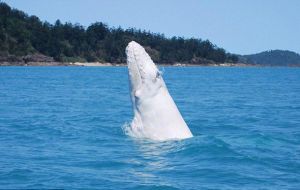MercoPress. South Atlantic News Agency
Rare white humpback whale calf spotted near Australia’s Great Barrier Reef
 “A once in a lifetime experience” spotting the white whale (Photo AFP)
“A once in a lifetime experience” spotting the white whale (Photo AFP) An extremely rare white humpback whale calf has been spotted near Australia's Great Barrier Reef in an event witnesses described Thursday as a “once in a lifetime experience”.
Believed to be just a few weeks old, the baby humpback was seen at Cid Harbour in the famous reef Whitsunday Islands area by local man Wayne Fewings, who was with his family in a boat when he spotted a whale pod.
“We were just drifting when I noticed the smaller whale in the pod was white. I couldn’t believe my eyes, and I just grabbed my camera” Fewings said.
“Then the white calf approached my boat, seeming to want to check us out. I was just so amazed at seeing this animal, it made me think how truly astounding the Great Barrier Reef is,” he added of the sighting on Saturday.
“I feel very lucky to have witnessed this, it's a once in a lifetime experience.”
Reef official Mark Read said white whales were highly unusual, with only 10-15 believed to exist among the 10,000-15,000 humpbacks living along Australia's east coast, and purely white ones -- like the calf spotted on Saturday -- rarer still.
Its parents could both have been dark humpbacks carrying the recessive white whale gene, but Read said one or either may also have been white themselves, raising speculation it was the offspring of famous white humpback Migaloo.
Migaloo -- the name is an Aboriginal word meaning “whitefella” -- is the world's best-known all-white humpback and has built up a loyal following in Australia since first being sighted in 1991.
Read said it was impossible to speculate on the baby humpback's parentage without genetic tests to compare with samples taken from Migaloo.
Humpback whales are currently on their southern migration and Read said the baby white would be feeding heavily from its mother as it laid down fat stores for the “cold Antarctic waters.”
Its sex was unknown and Read said there were no plans to bestow the young mammal with a name of its own.
“We'd be pretty comfortable for him or her just to simply remain anonymous and just live out its life in relative peace and harmony,” Read said.
Australia's east coast humpback population has been brought back from the brink of extinction following the halting of whaling in the early 1960s, he added, describing it as a “conservation success story”.




Top Comments
Disclaimer & comment rulesCommenting for this story is now closed.
If you have a Facebook account, become a fan and comment on our Facebook Page!